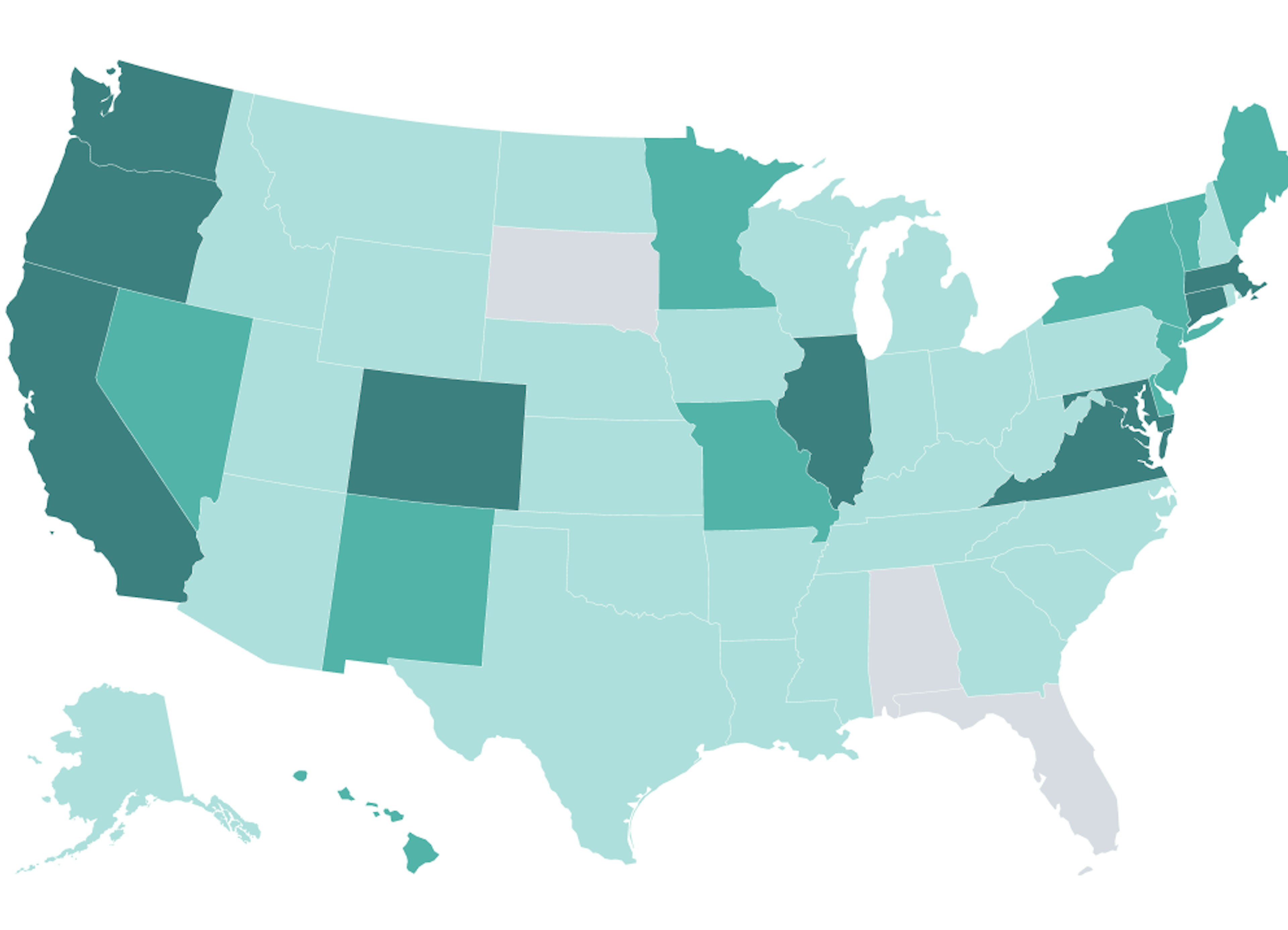Key Takeaways
RetirePath Virginia is an automatic-enrollment, paycheck-deduction IRA run by Virginia529, an independent agency of the Commonwealth of Virginia
Any business eligible in 2023 must register by February 15, 2024
Employers with 25+ employees that have been in business 2+ years are required to participate, or offer a qualified plan such as a 401(k)
Approximately 45% of private-sector workers in Virginia lack access to a retirement plan through their job, outpacing the national rate in 2020 of 33% by a wide margin. Following in the footsteps of states like Oregon, California, and Illinois, however, the commonwealth passed legislation to establish a state-sponsored retirement program for many of these Virginians through their place of employment.
In January 2021, Del. Luke Torian introduced HB 2174, which would establish RetirePath Virginia, an automatic-enrollment, paycheck-reduction individual retirement account (IRA) through the Virginia College Savings Plan, Virginia 529. Virginia Governor Ralph Northam signed the bill into law on April 15 of that year after unsuccessfully lobbying for the removal of a provision limiting eligibility to employees working a minimum of 30 hours a week.
The law went into effect July 1, 2021, and employer registration opened in 2023. Eligible employers received the first registration notification before July 1, 2023. Businesses are eligible for RetirePath in 2023 must register before February 15, 2024. As the program points out, eligible employers can register for the state-run program as soon as they receive their notification. And those that don’t offer one already can also start a qualifying, employer-sponsored retirement savings plan like a 401(k) today.
How RetirePath Virginia benefits employers & employees
Historical lack of workplace retirement access and portability is a widely acknowledged barrier to amassing sufficient retirement savings for many Americans. These workers may lack the ability or incentive to participate in alternative options—and may face the temptation to simply cash out their 401(k) when they lose a retirement plan. RetirePath Virginia provides employers an option for providing their workers a retirement plan. Below are key program details:
Eligible employees will be automatically enrolled in the retirement plan
Automatic payroll deductions will contribute 5% of an employee’s pay after taxes
Automatic deduction will increase by 1% each year (“auto-escalation”) until it reaches the cap of 10% of pay
Employees can change the percentage of their contribution or opt out of the program altogether
The default investment is a Target Date Retirement Fund, but employees can customize their investment
RetirePath Virginia aims to address the savings disparities among different racial and socio-economic groups by extending access to the equivalent of an employer retirement plan to more types of workers. “This is an opportunity for more Virginia workers to build long-term savings not tied to a single employer, said Del. Torian in a statement. “RetirePath Virginia will be a crucial wealth-building mechanism.”
How RetirePath Virginia works for employers
Employers that meet the following qualifications are required to participate in RetirePath Virginia:
Have 25 or more employees in the previous year,
Have been in operation at least two years
Do not already offer a qualified plan (such as a 401(a), 401(k), 403(a), 403(b), 408(k), 408(p), or 457(b))
Not sure if this applies to your business? Take RetirePath’s Eligibility Quiz.
As with other state plans in effect—and by design—employer requirements are minimal. Employers subject to the mandate only need to present proof of an alternative qualified plan (see above) or register by the deadline of February 15, 2024, set up a payroll deduction for each eligible employee, and hold an annual open enrollment period.
With most administration tasks handled by the Virginia College Savings board, there are no fees and no fiduciary responsibility for employers, meaning employers have no legal responsibility for employees opting in or out, nor for any investment decisions. In keeping with IRS restrictions on payroll deduction IRAs, employers are prohibited from making contributions, such as matching funds.
Which employees qualify for RetirePath Virginia?
Employees who are at least 18 years of age or older and those who work a minimum of 30 hours a week (part-time workers are not eligible for the program) will be automatically enrolled in RetirePath Virginia once their employers register. However, all qualified employees may opt out of the program at any time. Self-employed individuals are also eligible to participate as long as they have taxable Virginia income.
As explained in HB 2174, the goal of the bill is, “To promote greater voluntary retirement savings for private-sector workers in a convenient and portable manner,” and plans will be portable. This means employees could transfer them to their next employer should they become eligible for a traditional employer-sponsored retirement plan.
Learn more about RetirePath Virginia alternatives:
Use our calculator to see how much a 401(k) would cost with SECURE Act tax credits applied.
Read more about the fees associated with launching and maintaining a 401(k) plan for your business.
The state of retirement saving in the Commonwealth of Virginia
Lack of access to an employer-sponsored retirement plan is a problem that affects not only individuals but also the states in which they reside. Research shows that workers with a retirement plan available through their employer are 15 times more likely to save for retirement. And although many people without an employer plan are eligible for IRAs, very few of them establish or contribute to one. According to AARP, fewer than 5% of workers earning between $30,000 and $50,000 without an employer plan contributed to an IRA. On a broader scale, retirement shortfalls cost states money because they often cause more demand for public programs such as Medicaid.
Approximately 1.2 million private sector workers in Virginia don’t have access to an employer-sponsored retirement savings plan. While this cuts across all education levels, workers employed by small businesses (those with fewer than 100 employees) are far less likely to have a plan than their counterparts at larger companies.
The issue disproportionately impacts minorities: A recent Virginia state study found that nearly a third of private-sector employees not covered by a retirement plan are Black, Asian, or Hispanic. As the state becomes increasingly diverse (in 2020, people of color made up 41% of the state’s population, compared with 35% a decade prior), the potential burden on public programs from retirement-age individuals with insufficient savings is only set to grow.
Explore your options with a 401(k) for your Virginia business
As RetirePath’s site notes, the program “is not meant to replace or compete with employer-sponsored plans, which have advantages.” If RetirePath Virginia’s IRA doesn’t seem right for your employees or your business, remember that you have alternatives, including establishing a 401(k). There are a couple key differences between IRAs and 401(k)s:
401(k)s allow employers to provide matching contributions, which is a powerful incentive for attracting and retaining employees. Employer matching could make a difference of about several thousand dollars per employee by the time they decide to retire.
401(k)s have higher contribution limits compared to IRAs ($23,500 vs. $7,000, respectively, in 2025), which may be attractive to workers wishing to catch up on their retirement savings.
Low-cost 401(k) with transparent pricing
Sign up for an affordable and easy-to-manage 401(k).
If you’re interested in exploring your options for establishing a 401(k)—to either get ahead of RetirePath’s February 2023 deadline or give your employees a jump start on saving—you should know that small businesses have options, with plans for varying budgets. Learn more about your retirement plan options.
Article By
The Human Interest TeamWe believe that everyone deserves access to a secure financial future, which is why we make it easy to provide a 401(k) to your employees. Human Interest offers a low-cost 401(k) with automated administration, built-in investment education, and integration with leading payroll providers.


